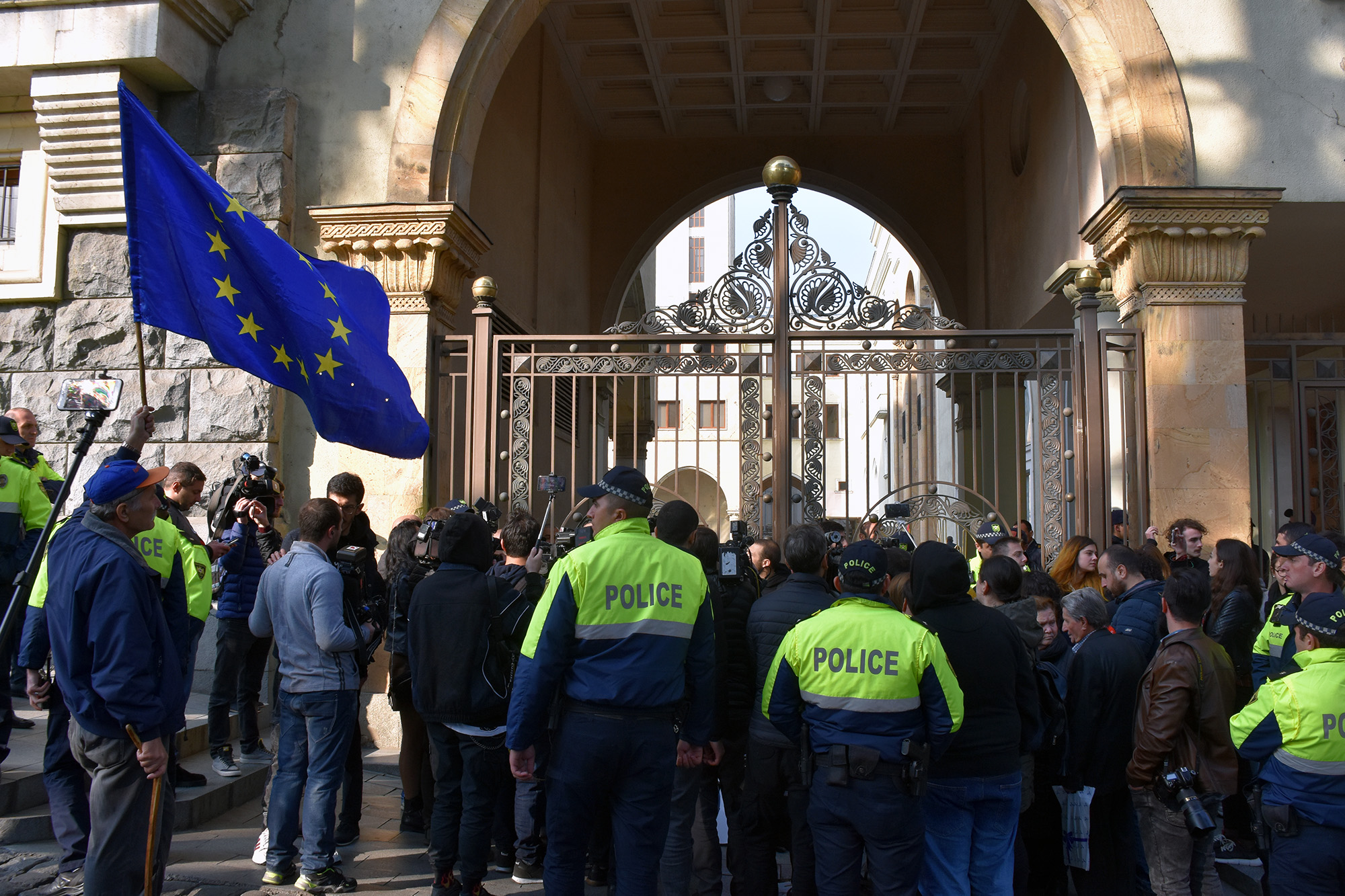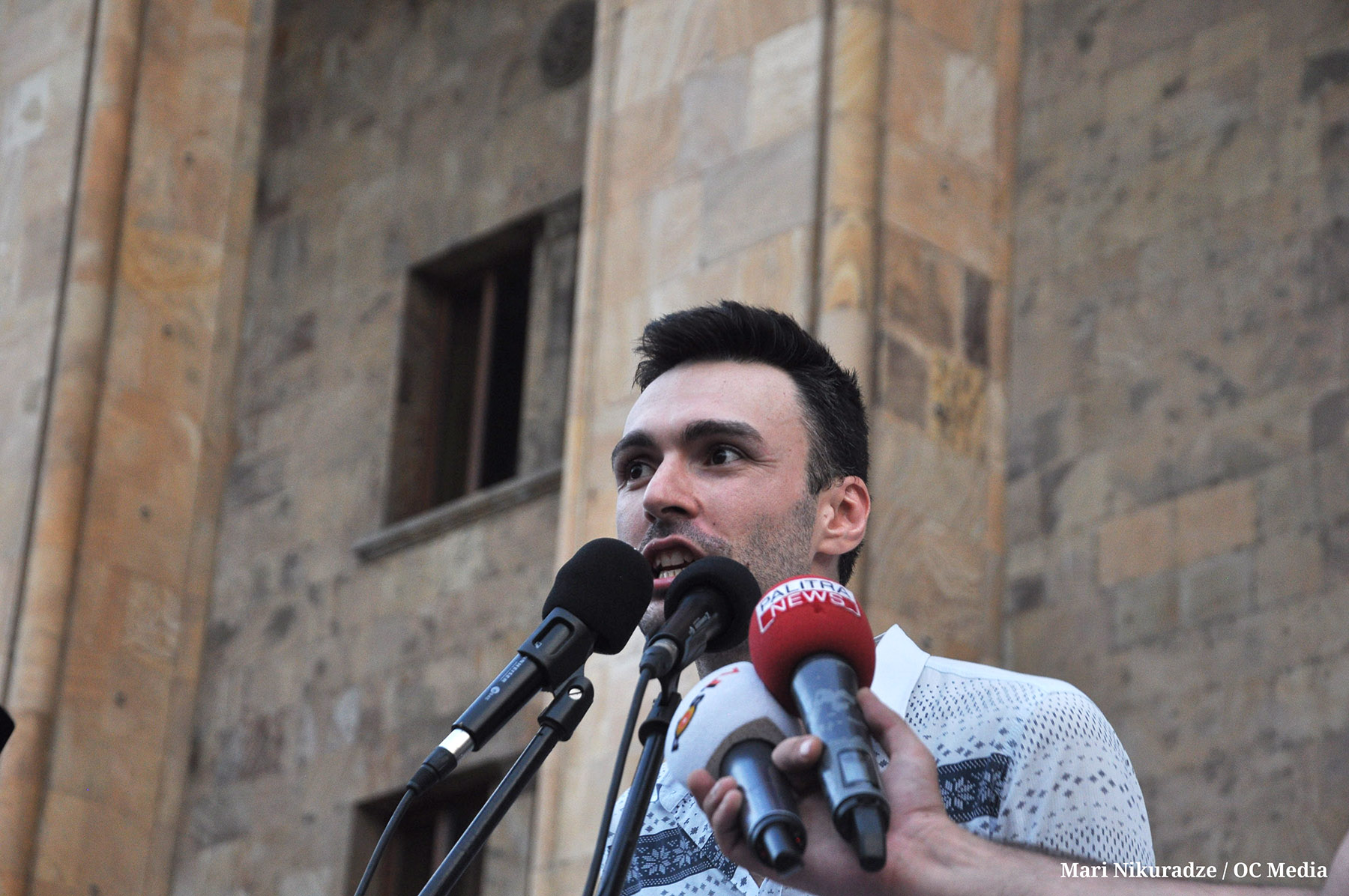

The Georgian Parliament has failed to adopt a bill to switch the country’s electoral system from a mixed to a fully proportional system.
Thursday’s vote came after three days of negotiations between MPs from the ruling Georgian Dream party and its chair, Bidzina Ivanishvili, who authored the bill.
The change required amendments to the constitution, meaning at least three-quarters of parliament’s 150 MPs needed to vote in favour. It received 101 votes for and 3 against, falling short of the 113 votes needed to pass.
The three MPs who voted against the bill, Enzel Mkoiani, Kakha Okriashvili and Dimitri Khundadze, are all members of Georgian Dream.
All opposition and independent MPs voted in favour of the bill.
Minutes after the vote, eight Georgian Dream MPs who voted for the bill, announced they had left the parliamentary majority in protest.
These included Vice-Speaker and member of Georgian Dream’s political council Tamar Chugoshvili, as well as the heads of the EU integration, education, and foreign relations committees.
As soon as the decision was announced, protesters began gathering outside parliament. There was a minor confrontation with police after protesters attempted to block the road outside parliament as MPs were departing. Later they succeded in blocking the central Rustaveli Avenue.


Opposition parties European Georgia, the Alliance of Patriots, the United National Movement (UNM), and the recently formed Lelo Party, all announced they will join a larger demonstration planned for the evening.
Tbilisi Mayor Kakha Kaladze the General Secretary of Georgian Dream, showed a middle finger to protesters at parliament as he was leaving in his car. He later claimed that he was doing so not to protesters but to his own bodyguards.
Transitioning to a fully-proportional electoral system was a key concession made by the government in the wake of mass protests in the capital in June.
Thousands took to the streets on 20 June, after Russian MP Sergei Gavrilov was invited to address parliament from the speaker’s tribune. A violent dispersal of a demonstration outside parliament late that evening led to further protests.
Thousands continued to protest outside parliament for weeks after, forcing the resignation of Parliamentary Speaker Irakli Kobakhidze.

Reacting to the vote, Shota Dighmelashvili, one of the leaders of the youth-led For Freedom group, which spearheaded protests following 20 June, wrote on Facebook urging people to again take to the streets.
‘Civil disobedience has begun. Full mobilisation is necessary. Bidzina [Ivanishvili] entirely disregarded any legitimacy of the public and said that he will base his power on a law enforcement cabinet.’
One of the main demands of the previous protests was the resignation of then–Interior Minister Giorgi Gakharia, who was appointed Prime Minister in September.
Dighmelashvili speculated that Georgian Dream MPs failing to vote for the bill and subsequently leaving the party had been orchestrated by the party chair himself.
‘They have orchestrated a circus of slaves rebellion in the party’, Dighmelashvili wrote. ‘[Ivanishvili has said] screw society. Now it’s a time for society to answer. Power to the people.’

The bill was initiated in parliament by 93 ruling party MPs, many of whom did not vote in favour of it during Thursday’s vote. Besides a fully proportional system, it also proposed no electoral threshold for Georgia’s 2020 parliamentary elections and banned electoral blocks.
‘We wanted to adopt this bill and switch to fully proportional electoral system’, Speaker Archil Talakvadze said after the vote. ‘Now that we no longer have a constitutional majority, we weren’t able to adopt this bill.’
‘A large majority of our MPs voted in favour of this bill’, he said. ‘Of course, we are not avoiding responsibility. I call on everyone to keep calm.’
A slim majority of 57 of 106 Georgian Dream MPs voted in favour of the bill.
Giga Bokeria, an MP and one of the leaders of the opposition European Georgia Party, slammed the ruling party for failing to pass the bill.
‘Ivanishvili and his team have taken a destructive step for Georgian democracy. This is an insult to all of society. Nobody believes in this theatrical performance. Ivanishvili and those surrounding him are responsible for what happened.’
Internal disagreements or a ‘coordinated plot’
After the vote, Ivanishvili said he was disappointed and ‘sincerely sorry’ for the outcome.
Even though the bill failed because of a lack of support from Georgian Dream MPs, he blamed the opposition United National Movement (UNM) Party for the outcome.
‘The opposition did everything to disrupt the fragile consensus that was made in our team in the summer. When the discussion of the initiative was almost over and it was going out for voting, UNM members insulted our MPs personally in the parliament’s hall. It seems, the majoritarians had enough of it and unfortunately, I wasn’t able to revert them to a constructive condition’, Ivanishvili said in a lengthy statement.
He added that the fact that Georgian Dream MPs opposed the bill shows that there’s a ‘real democracy’ in the Georgian Dream.
Switching to a proportional electoral system has been a major demand from opposition parties in Georgia for years. Georgian Dream officials previously said they supported the idea, but not until the 2024 parliamentary elections.
A proportional system with no threshold would likely produce a more diverse parliament with more smaller parties.
The Georgian Parliament started discussing the bill on Tuesday, however, some MPs from the ruling party, including those who initiated and supported it in the first place, already began speaking out against it.
Dimitri Khundadze, the majoritarian MP (an MP elected from a particular constituency) representing Mtskheta asked several critical questions, despite being among the 93 MPs who initiated the bill.
‘Why do we deprive our citizens of the right to have their own representative in parliament’, Khundadze said, adding that a fully proportional system comes with risks, such as small parties gaining ‘disproportionately large power’.
He also said he was unsure whether local governments were ready for the switch.
‘We had agreed that switching to fully a proportional system in 2020 was the right move to strengthen local governments so that they wouldn’t need majoritarians as intermediaries to help them communicate with the central government’, Khundadze said.
Another MP, the majoritarian for Sighnaghi, Irakli Shiolashvili, said he saw ‘risks for the country’s stability in the proportional system’.
‘I won’t change my mind. I’ll try to convince other MPs and attempt once again to gain other MPs’ support. If there is pressure, I’m ready to leave parliament’, Shiolashvili said.
Due to disputes within Georgian Dream on the issue, voting on the bill was twice delayed and the ruling party held three meetings with the chair of Georgian Dream.
On Thursday, after another meeting between Ivanishvili and ruling party MPs, parliamentary majority leader Gia Volski said that there would be a ‘free vote’.
Georgian Dream MP Mikheil Kavelashvil told journalists that he would oppose an electoral system that would give higher chances of winning to the opposition United National Movement.
‘If I’m convinced that this won’t happen and the proportional system will reduce their number [in parliament], I will support it’, said Kavelashvili.
Meanwhile, MP Eka Beselia, who left Georgian Dream in January along with several others, said the process had been coordinated in advance in order to scuttle the bill.
‘Yesterday, during the plenary sitting it became obvious that MPs were artificially angry […] It was obvious that the ruling party MPs wanted to disrupt the plenary session and that they were carrying out their homework very unconvincingly’, said Beselia.
She also said that the aim of their efforts was to ensure the bill did not pass.
‘Why do they want this? Because the ruling party sees the opportunity to maintain power in the current electoral system’, Beselia said.
The US Embassy in Tbilisi released a statement later on Thursday saying they were ‘disappointed […] that despite support from opposition parties, an insufficient number of Georgian Dream parliamentarians supported the required constitutional amendments in today’s vote.
‘As we stated previously, the US Embassy welcomed the Georgian Dream party’s stated intention to transition to fully proportional parliamentary elections in 2020 and considered this an important step in advancing Georgia’s democratic development and strengthening trust among political parties’, the statement said.
They also urged the government to pass electoral reforms to address ‘shortcomings’ in the 2017 and 2018 elections.







